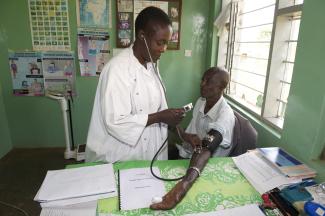Peacebuilding
Patience required
 Reuters
A UN peacekeeper argues with protesters in Mali.
Reuters
A UN peacekeeper argues with protesters in Mali.
In 2012, however, a dramatic crisis suddenly rocked the entire state. Touareg militias rose up, and they were supported by radical Islamists with weapons from Libya. Mali’s military managed to topple the elected president, but not to stem the insurgency in the north, where the religious fundamentalists soon marginalised the Touaregs and introduced Sharia law.
The example of Mali shows that peace is often quite fragile. An old conflict, religious extremism and easily available arms can fast make a terrible difference. Real peace is about a lot more than the absence of armed violence. It must be resilient to external shocks.
UN leaders speak of “peace missions” when armed forced are deployed to stop civil strife in a country. Such missions are often first and necessary efforts towards making peace, but they cannot be the only efforts. Measures to promote peace in the long run in a substantial way are called “peacebuilding”.
Achieving durable peace is a huge challenge when people are frustrated and upset about injustice, when they feel deprived of opportunities and are forced to compete for land and water for example. Violence erupts easily in our era of globalisation, as guns tend to be cheap, and instructions for building bombs can be downloaded from the internet.
Peacebuilding must therefore tackle the underlying issues that haunt a crisis area, such as conflicts that keep lingering on, widespread injustice and old traumas. For a society to find peace, all of its people need decent livelihoods and promising perspectives. Adversaries must talk with one another. Civil society must be strong, and a minimum of justice must be safeguarded. Societies need solid institutions, as otherwise one’s own gun will appear to guarantee more protection than any state agency, and taking the law into one’s own hands will seem to make more sense than putting faith in the judiciary.
Wars waged by regular armies between sovereign states have become exceptions. Today’s violent conflicts tend to be asymmetric, involving informal militias and government-sponsored security forces. The scenarios are complex, involving many parties and interests, and Guerrilla methods are common. Armed peacekeepers often cannot achieve very much in settings of this kind.
Peacebuilding is therefore indispensable. Yes, it is true that its results can often not be measured. After all, it takes a long time for enemies to begin to deal with their differences by non-violent means. Accordingly, it takes a lot of patience and strong convictions to build lasting peace.
In Mali, French troops intervened. With African support and on behalf of Mali’s transitional government, they reaffirmed the state’s territorial integrity. The country has since taken important steps towards building peace. Credible presidential elections were held this summer. That this could be done in such a short time shows that not all developmental achievements of the past two decades were lost in the recent crisis. Whether the peace will last remains to be seen. It certainly deserves a chance.
Eva-Maria Verführt
